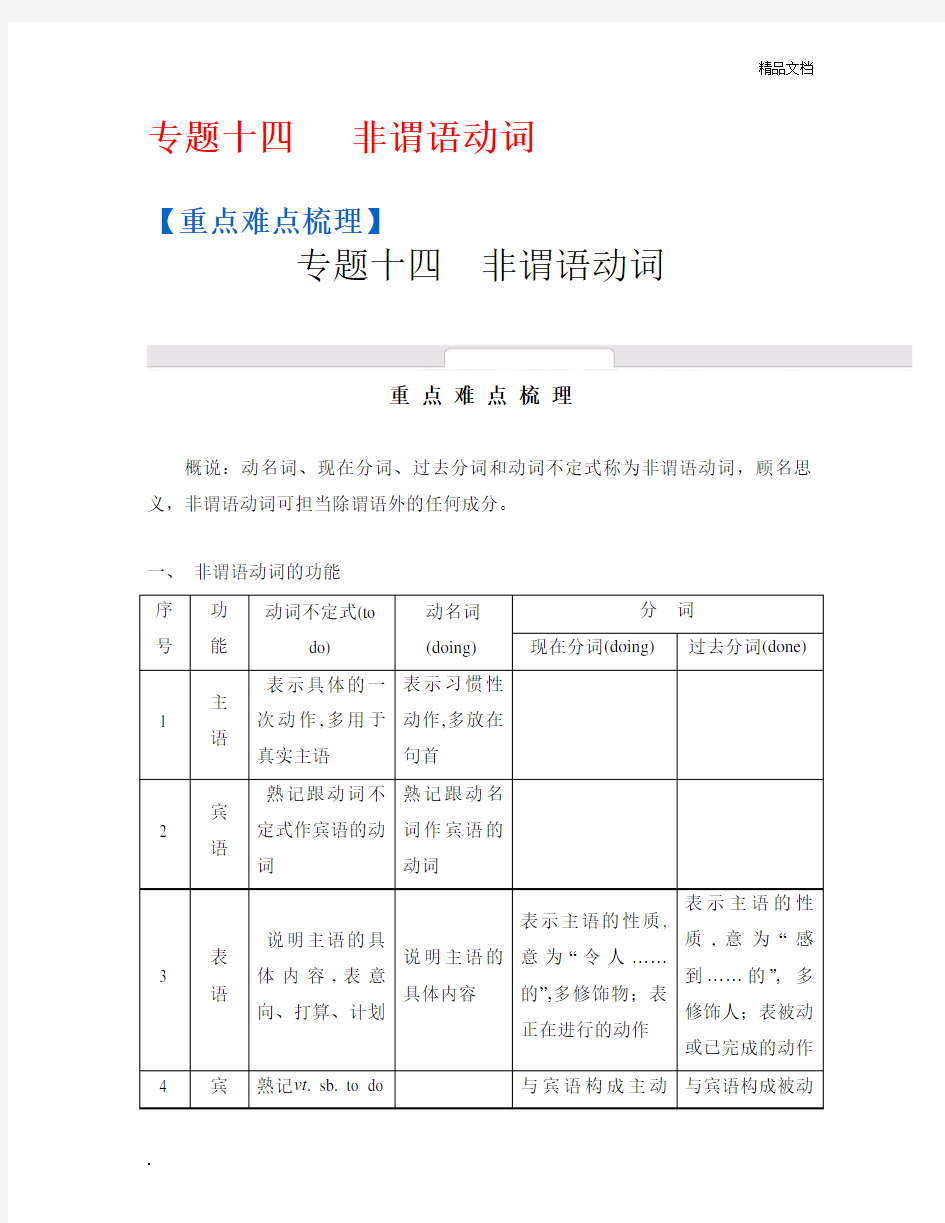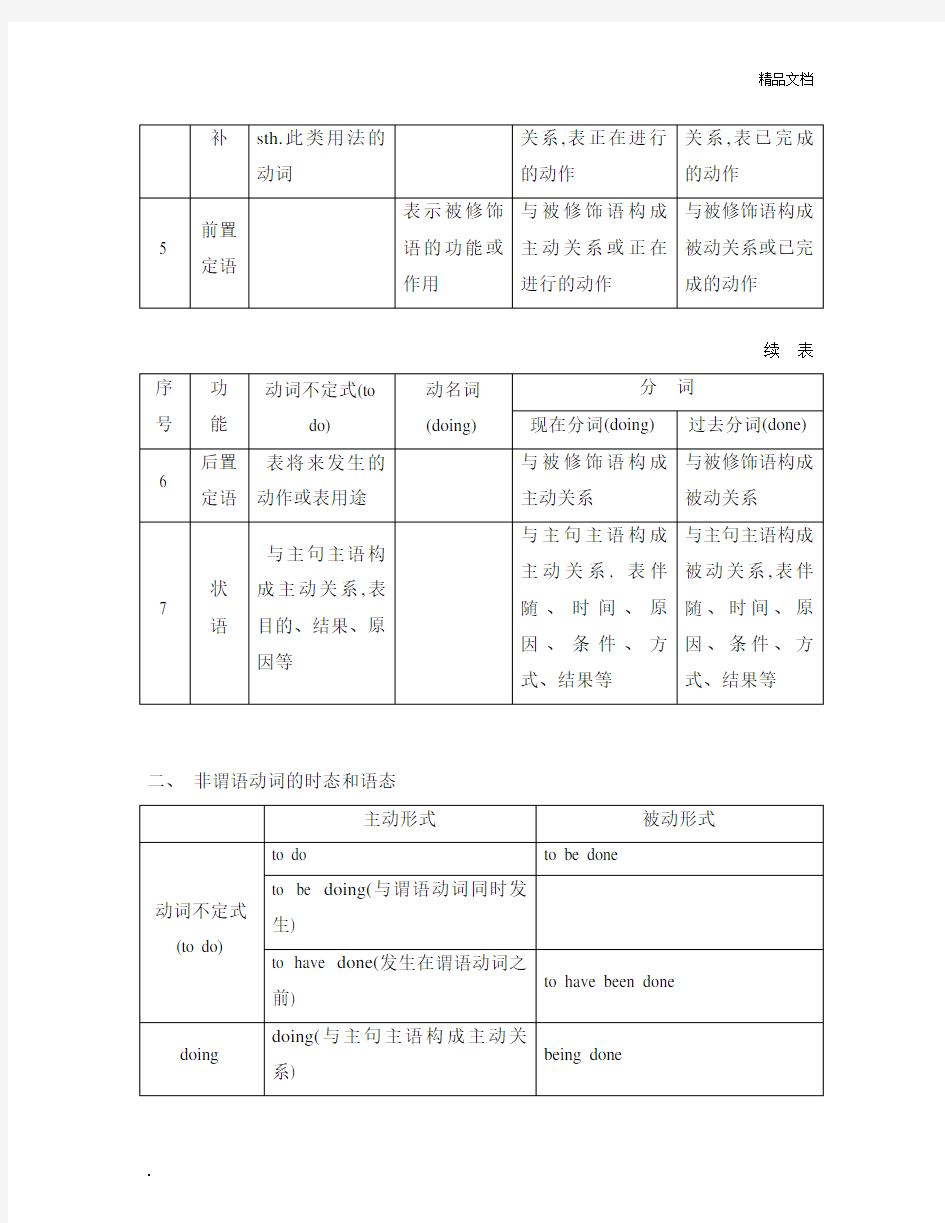

专题十四非谓语动词
【重点难点梳理】
专题十四非谓语动词
重点难点梳理
概说:动名词、现在分词、过去分词和动词不定式称为非谓语动词,顾名思义,非谓语动词可担当除谓语外的任何成分。
一、非谓语动词的功能
序号功
能
动词不定式(to
do)
动名词
(doing)
分词
现在分词(doing) 过去分词(done)
1 主
语
表示具体的一
次动作,多用于
真实主语
表示习惯性
动作,多放在
句首
2 宾
语
熟记跟动词不
定式作宾语的动
词
熟记跟动名
词作宾语的
动词
3 表
语
说明主语的具
体内容,表意
向、打算、计划
说明主语的
具体内容
表示主语的性质,
意为“令人……
的”,多修饰物;表
正在进行的动作
表示主语的性
质,意为“感
到……的”, 多
修饰人;表被动
或已完成的动作
4 宾熟记vt. sb. to do 与宾语构成主动与宾语构成被动
续表
二、非谓语动词的时态和语态
having done(发生在谓语动词之
前)
having been done
过去分词done(与主句主语构成被动关系)
用法:非谓语动词的一般式表示与主句谓语动词同时或之后发生的动作;非谓语动词的完成式表示在主句谓语动词之前发生的动作。
如:(1) Doing my homework, I heard a cry for help.(heard与doing的动作同时进行)做作业时,我听到了喊救命的声音。
(2) Having done my homework, I went to bed.(do发生在谓语动词went之前)做完作业后,我就上床睡觉了。
三、动词不定式和动名词作宾语的比较
情况常用动词
只接动词不
定式作宾语的动词hope, want, offer, long, fail, expect, wish, ask, decide, pretend, manage, agree, afford, determine, promise, happen
只接动名词作宾语的动词或短语mind, miss, enjoy, imagine, practise, suggest, finish, escape, excuse, appreciate, admit, prevent, keep, dislike, avoid, risk, resist, consider can’t help, feel like, succeed in, be fond o f, object to, get down to, be engaged in, insist on, think of, be proud of, take pride in, set about, be tired of, look forward to, devote oneself to, be worth, be busy, pay attention to, stick to, adapt to
两
者都可以意义基本
相同
begin, start, like, love, hate, prefer, continue(接动词不定式多指具体的
动作;接动名词多指一般或习惯的行为)
need, want, require(接动名词用主动形式表示被动意义;若接动词不
定式则应用被动形式)
意义相反
意义不同
四、非谓语动词作宾语补足语的区别
序号类别常见动词
与宾语的逻辑关系
及时间概念
例句
1 不定式ask, beg, expect,
get, order, tell,
want, wish,
encourage
主谓关系强调动
作将发生或已经完
成
(1) I expect them to win
the game.
我期望他们赢得比赛。
(2) I heard him call me
several times.
我听见他叫了我几遍。have, notice, see,
watch, hear, feel,
let, make
2 现在分
词notice, see, watch,
hear, find, keep,
have, feel(即:感官
动词和使役动词)
主谓关系强调动
作正在进行,尚未完
成
I found her listening to the
radio.
我发现她在听收音机。
3 过去分
词
动宾关系动作已
经完成,多强调状态
We found the village
greatly changed.
我们发现这个村子发生
了很大的变化。
五、现在分词和过去分词的用法对比
分现在分词过去分词例句
六、特别提示
名词的逻辑主语可用宾格代词
或不带所有格。但作主语则不
行。
我/汤姆在这里吸烟,你会介意吗?
(2) My/Tom’s smoking here annoyed him.
我/汤姆在这里吸烟使他很生气。
动名词作主语还可用于“There
be no+动名词”结构和“布告”形
式的省略结构中。
(1) There is no knowing what he will do
next.
不知道他下一步会做什么。
(2) No smoking.禁止吸烟。
【梯度升级训练】
梯度升级训练
(见学生用书P269—P270)
一、用所给动词的适当形式填空
1. turn
(1) Turn to the left, and you’ll see the bus stop.
(2) Turning to the left, you’ll see the bus stop.
2. tell
(1) Having been told/Told many times, he still couldn’t understand the question.
(2) Having told me the bad news, he went out of the room sadly.
3. give
(1) Nothing could make us give up the hope.
(2) Crusoe made a candle to give light.
4. examine
(1) I want to examine your bag.
(2) Your eyes want examining/to be examined.
(3) I want my eyes to be examined/examined this afternoon.
5. get
(1) What’s the way Smith thought of to get enough money to buy the new house?
(2) I’m thinking of getting Tom to repair my bike.
6. smoke
(1) We don’t allow smoking in the office because of the public health.
(2) We don’t allow anyone to smoke in the office because of the public health. 7. listen
(1) My little brother enjoys nothing but listening to music.
(2) My little brother does nothing all day but listen to music.
(3) My little brother had no choice but to listen to me.
8. hear
(1) The teacher raised his voice in order to make himself heard.
(2) The teacher raised his voice in order to make his students hear what he said.
(3) The children talked so loudly at dinner table that I had to struggle to be heard.
9. discuss
(1) The problem is worth discussing again.
(2) The problem is worthy to be discussed again.
(3) The problem is worthy of being discussed again.
10. get, fail
(1) It passes right through their bodies, only getting a little thicker and sweeter.
(2) He worked harder only to fail again.
11. ask
(1) No one can stop us asking questions.
(2) We stopped to ask a schoolboy the way to the teachers’ office.
12. face
(1) Faced with so much trouble, we failed to complete the task on time.
(2) Nearly every great building in Beijing was built facing south.
13. hold
(1) The parents’ meeting to be held next Saturday is very important.
(2) The 29th Olympic Games held in Beijing was a great success.
(3) The parents’ meeting being held in our school now is important.
14. make
(1) To make this cake, you need 2 eggs, 175g sugar and 175g flour.
(2) Having made the cake, she got down to cooking some milk.
(3) I lost my way in complete darkness and, to make matters worse, it began to rain. 15. clean
(1) The room is so dirty that I can’t help cleaning it.
(2) I’m too busy, so I can’t help (to) clean the room.
(3) The room is too dirty. I can’t help but clean it.
16. type
(1) I knew I would be busy today, so I had my paper typed last night.
(2) I can’t go wit h you. I have some papers to type.
(3) Do you have any papers to be typed, Sir?
17. settle
(1) With many problems to settle, the president will have a hard time.
(2) With the problem settled, he had a good sleep last night.
(3) With the secretary settling the problem, he is reading the newspaper leisurely in the office.
18. cheat
(1) “I ever saw him cheat an old man of 500 yuan,” he said to the police.
(2) He was seen to cheat an old man of 500 yuan in the street yesterday.
(3) Unluckily, the policeman saw him cheating an old man around the corner.
19. The film was disappointing and all of us were very disappointed. (disappoint)
20. At the beginning of class, the noise of desks being opened and closed(open and close) could be heard outside the classroom.
二、语法填空
A long time ago, there was a huge huge apple tree. A little boy came 1(sing) and jumping and lay under it every day. He would climb to the tree top, eat the apples, and take a nap in the shade. He loved the tree and the tree loved to play with him.
In the 2(follow) years, the boy came and cut the branches 3(build) a house, used the trunk on which he used to climb 4(make) a boat and then never showed up for a long time.
Finally, 5(be) tired of travelling, the boy returned. “Sorry, my boy, but I don’t have anything for you anymore. No more apples for you...” the tree said. “I don’t have teeth to bite. 6(eat) apples no longer appeals to me,” the boy replied. “No more trunk for you to climb on.” “I am too old 7(climb) now,” the boy said. “I really can’t give you anything...the only thing left is my dying roots,” the tree said with tears. “I don’t need much now, just a place 8(rest). I’m tired after 9(travel) all these years,” the boy replied. “Good! Old tree roots are the best place to lean on and rest. Come, come, sit down with me and rest.” The boy sat down and the tree was glad, 10(smile) with tears.
本文是一篇记叙文。老苹果树把它的一切无私地送给小男孩。然而,男孩注定要远行。多年以后,厌倦了旅行的男孩又回到了苹果树身边。然而,老苹果树只剩下了树根供他倚靠。
1. singing此处为came的伴随状语,且与主语为主动关系,故用singing。
2. following此处为动名词following作定语,表示“在接下来几年”。
3. to build此处用动词不定式表目的。
4. to make此处用动词不定式表目的。
5. having been此处为伴随状语,且与主句构成因果关系,故用having done结构。
6. Eating此处用动名词形式主语。
7. to climb too...to...:太……,而不能……
8. to rest此处为动词不定式充当后置定语,表示“一个可以休息的地方”。
9. travelling介词after后接动名词形式。
10. smiling此处为伴随状语,且与主语the boy构成主动关系,故用smiling。
三、单句改错
1. Group activities will be organized after class to helping children develop team spirit. 【答案】helping→help
2. The producer comes regularly to collect the cameras returning to our shop for quality problems.
【答案】returning→returned
3. Anxiously, she took the dress out of the package and tried it on, only find it didn’t fit.【答案】only后加to
4. It’s quite hot today. Do you feel like go for a swim?
【答案】go→going
5. There is a note pinned to the door says when the shop will open again.
【答案】says→saying
6. Having been spent nearly all our money, we couldn’t afford to stay at a hotel.
【答案】去掉been
7. The film star wears sunglasses. Therefore, he can go shopping without recognized. 【答案】without后加being
8. There are some health problems that, when not being treated in time, can become bigger ones later on.
【答案】去掉being
9. I stopped the car to taking a short break as I was feeling tired.
【答案】taking→take
10. I remembered to locking the door before I left the office, but forgot to turn off the lights.
【答案】去掉第一个to
11. The party will be held in the garden, weather permitted.
【答案】permitted→permitting
12. If he takes on this work, he will have no choice but meet an even greater challenge. 【答案】meet前加to
13. Tod ay China’s economy is booming. Chinese seems well worth being learning.
【答案】去掉being
14. We look forward to work with you hand in hand to create a better future!
【答案】work→working
15. Judged from the response of the audience, the performance was quite a success. 【答案】Judged→Judging